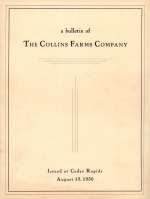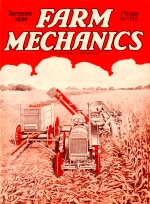|
I received a copy of “Industrial Farming”, clipped from the Cedar Rapids Gazette by my sister, and sent by mail – a fitting means for an article in the “Time Machine” section (May 24, 2020). The article was about my grandfather, Merle Collins, and his progressive and ambitious effort to bring modern farming methods and machinery to eastern Iowa in the late 1920s and early 1930s. In summarizing this history, Diane Fannon-Langton concludes that these modern methods were indeed effective in reducing costs and increasing crop yields until the Depression forced Collins Farms into bankruptcy. I am writing this article both to express an appreciation for this renewed interest in Collins Farms, and also to perhaps expand on the connotations of the title, “Industrial Farming”. A number of years ago, Jay Kacena, a family friend and civic-minded resident of Marion, sent me a reproduction of the publication “A Bulletin of The Collins Farms Company (Cedar Rapids, August 15, 1930)”. This bulletin is as much a statement of company philosophy as it is an outline of methods and business plan. The very first sentence stands out: “The kind of agriculture introduced - - - by M.H. Collins cannot be called ‘chain farming’, nor ‘machine farming’ nor ‘corporate farming’. We, who have been brought up to regard farming as a tradition - - - have no neat phrase in our minds which conveys the picture. Collins Farms Company employs power machinery - - - under unified management and control. - - - But these innovations of the Company’s program are merely features and not the idea itself.” |
 A young Arthur Collins, in suit and tie, measuring soybean yield for Collins Farms Company, circa 1930. At this time Collins Farms nurtured a seedling Collins Radio Co. |
 Collins Farms corn picker. The Collins Farms model was to operate as a "horseless" farm. |
The Bulletin expresses the goal that by this example, young men would be inspired to obtain an education in agricultural science and either become employees of Collins Farms or set out on their own where the new methods “can be put in effect by individual operators who are able to buy or rent enough land to form an efficient unit, or perhaps by cooperative groups of farmers. - - - He will form a flexible group which can easily adapt itself to whatever form of organization the economic demands of farming may bring in the future.” In other words, Collins Farms was offered as a model for the entire farming community. These were very difficult times, especially in the Midwest, and Collins Farms was by its nature optimistically committed to expansion, which required a significant capital investment. Unfortunately, this was at a time when banks were protecting their capital, often through foreclosure, the ultimate fate of Collins Farms. One can only wonder that if an enlightened “venture capitalist” had supported the company, Collins Farms might have brought success and a higher standard of living to many farmers in eastern Iowa.
|
|
M.H. Collins as Collins Radio Co. Vice President, circa 1942. |
 |
 Collins Farms Brochure |  Farm Mechanics Article |  March 20, 1930 |